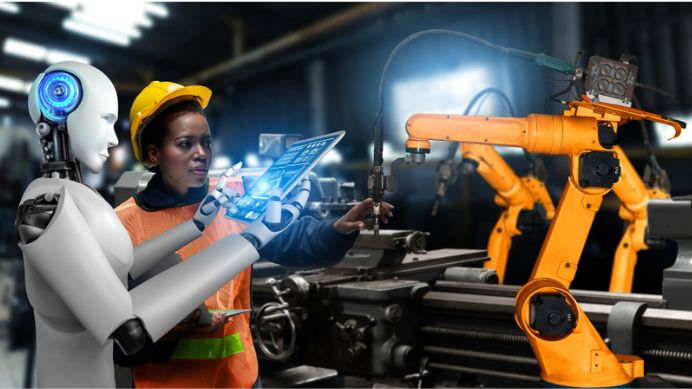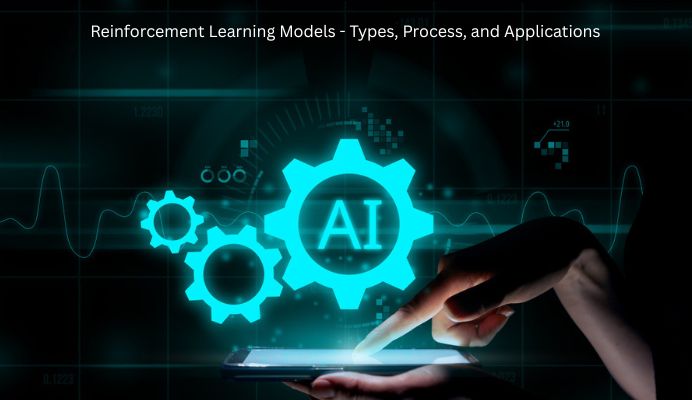
8 Best AI Use Cases Followed in Major Industries
Some key AI use cases are transforming major industries by enhancing operations and innovation. With the global AI market projected to reach $190.61 billion by 2025, industries like healthcare, finance, and retail are leading the charge in AI adoption.
For example, a study by McKinsey shows that AI can potentially deliver $13 trillion in additional global economic activity by 2030. In healthcare, AI-driven diagnostic tools have reduced errors by up to 50%. In comparison, AI-powered chatbots in finance have improved customer satisfaction rates by 20%.
Retail companies like Amazon leverage AI to enhance personalized recommendations, significantly boosting sales conversion rates. Businesses using technology aim to provide effective AI automation solutions that can be applied to various operational tasks.
8 Best AI Use Cases followed in Major Industries
AI has a significant impact on business growth. This section explores some key AI use case examples.

1. AI Use Cases in Healthcare
Integrating AI in healthcare offers many benefits, including optimizing medical management and improving patient outcomes.
- Precision medicine:
This is an area where AI capabilities shine. For instance, AI applications in immunomics and drug discovery are making significant strides in understanding diseases and developing targeted treatments.
Predictive analytics drives progress in precision medicine. It helps forecast disease progression and treatment outcomes. These insights enable healthcare providers to make more informed decisions, ultimately improving patient care.
- Diagnostic imaging
AI’s role in diagnostic imaging is transformative. Research studies have demonstrated the effectiveness of automated AI algorithms in detecting conditions like diabetic retinopathy, significantly reducing preventable vision loss.
AI is also used in radiotherapy planning, providing precision diagnostics that enhance treatment accuracy and patient outcomes.
- Virtual assistants
Virtual assistants powered by AI are revolutionizing patient engagement and care. These AI tools provide personalized communication, enhancing patient experiences and operational efficiency. Automating routine tasks with AI systems enables healthcare staff to focus more on patient care than on administrative duties.
AI-powered virtual assistants also offer flexible, personalized services that meet client needs faster and more securely. This improves patient satisfaction and streamlines healthcare operations, making the system more efficient.

2. AI Use Cases in Finance
AI in finance is reshaping the industry by enhancing risk management, fraud detection, and customer service. AI manages risk by analyzing data, providing faster insights, and enhancing decision-making processes. Financial institutions leverage AI for advanced modeling, which enhances risk assessment and management capabilities.
- Predictive analytics:
Predictive analytics powered by AI assists financial organizations in forecasting performance and identifying potential market risks.
AI analyzes large datasets to provide insights that drive better financial decisions, reduce risk, and predict future customer needs. This feature is crucial for maintaining optimal inventory levels and minimizing excess stock, thereby reducing costs. Business intelligence is essential in this process.
- Fraud detection
Fraud detection is another critical area where AI excels. It identifies unusual patterns in customer behavior to flag potential fraud in real time, helping financial firms mitigate losses. Techniques like Graph Neural Networks (GNNs) analyze large datasets to uncover hidden relationships that may indicate fraudulent activities, improving anomaly detection.

3. AI Use Cases in Retail
AI is transforming the retail industry significantly. Projections estimate the market for AI in retail will reach $45.74 billion by 2032.
AI technologies enhance operational efficiency and shopper experiences, creating personalized customer interactions and streamlining processes.
- Personalized recommendations
AI’s ability to analyze customer and transaction data allows retailers to offer personalized recommendations, enhancing user engagement and satisfaction.
Tailoring shopping experiences to individual preferences with AI systems increases the likelihood of repeat purchases. Around 75% of customers are willing to return to brands that offer personalized experiences.
- Inventory management
Effective inventory management is crucial for reducing costs and optimizing retail operations. AI technologies enhance inventory accuracy and monitor stock levels, minimizing instances of overstock or shortages.
- Sentiment analysis
Sentiment analysis is a powerful tool for retailers to gauge public opinion and adjust strategies accordingly. AI analyzes social media and unstructured data to understand consumer sentiment, allowing businesses to adapt their strategies and improve customer satisfaction.
Natural language processing tools help process customer feedback, providing valuable insights into customer preferences and behaviors.

4. AI Use Cases in Manufacturing
Integrating AI in manufacturing leads to higher quality standards and improved operational performance.
- Predictive maintenance
AI-driven predictive maintenance systems analyze sensor data to forecast equipment malfunctions, allowing for timely interventions and reducing production downtime. Analyzing real-time sensor data with AI forecasts machinery failures, enabling proactive maintenance that reduces unexpected downtimes and ensures continuous operation.
AI systems also analyze historical data to forecast equipment failures, allowing for timely maintenance and minimizing unexpected downtime.
- Quality control
AI plays a crucial role in quality control by ensuring that products meet high-quality standards. Automated AI systems can swiftly identify product defects, resulting in better quality assurance and reduced error rates in manufacturing.
- Supply chain optimization
AI enhances supply chain management by utilizing predictive analytics to forecast demand, optimizing inventory levels and logistics operations. AI tools significantly enhance supply chain efficiency by accurately forecasting demand patterns and managing logistics in real-time.
5. AI Use Cases in Education
AI personalizes learning by adapting content to fit individual student needs and learning styles. Additionally, AI enhances administrative efficiency by automating grading, report generation, and other time-consuming tasks.
- Personalized learning
AI makes learning more engaging through interactive tools and adaptive learning platforms that tailor educational content to individual student needs. Processing data about learners, teachers, and teaching interactions with AI offers personalized learning experiences that enhance student engagement and outcomes.
- Improved accessibility
AI technologies offer support to students with disabilities. They facilitate effective learning, break down barriers, ensure more inclusive educational experiences, and provide equal opportunities for all students.
Enhanced accessibility leads to increased student engagement and satisfaction, demonstrating the significant benefits of AI in creating a more inclusive and supportive learning environment.
6. AI Use Cases in the Automotive Industry
AI technologies are revolutionizing manufacturing processes, vehicle design, and customer experiences, leading to smarter, safer, and more efficient vehicles.
By leveraging AI-powered systems, the industry is enhancing operational efficiency, improving safety measures, and delivering personalized user experiences.
- Autonomous vehicles
AI algorithms facilitate the seamless integration of various vehicle sensors, improving environmental perception in self-driving cars. AI enables self-driving cars to make real-time decisions, significantly enhancing safety and efficiency on the road.
Machine learning algorithms enable autonomous vehicles to navigate complex environments, reducing the likelihood of accidents and ensuring a smoother driving experience.
- Connected car experiences
AI-driven infotainment systems adapt to user preferences, providing a more engaging and personalized in-car experience. AI algorithms offer personalized suggestions for products and services, enhancing customer journeys and satisfaction.
Virtual assistants assist customers during the car buying process, while AI chatbots provide quick responses to customer inquiries, creating a more streamlined and enjoyable car buying experience.
7. AI Use Cases in Agriculture
AI technologies enhance productivity and efficiency, enabling farmers to make data-driven decisions. Some of the AI use cases in agriculture include crop monitoring, yield prediction, and automated equipment.
- Crop monitoring
AI-powered computer vision systems enable precise monitoring of crop health, allowing for early detection of diseases and nutrient deficiencies. Assessing soil conditions and monitoring plant health in real-time helps prevent significant yield losses and ensures optimal growing conditions. This proactive approach enables farmers to address issues early, leading to healthier crops and higher yields.
- Yield prediction
Predictive analytics in agriculture uses AI to analyze data from various sources, helping farmers forecast crop yields and optimize resource allocation. Machine learning algorithms analyze sensor data and drone imagery to provide accurate crop forecasts, aiding farmers in making better farming decisions.
8. AI Use Cases in Marketing
The integration of AI in marketing is crucial for staying competitive in a rapidly evolving digital landscape. Let’s look at a few AI use cases in Marketing
- Customer insights
AI helps manage data overload by efficiently gathering and analyzing consumer information to discern preferences and behaviors. AI tools process large datasets to uncover detailed patterns in customer behavior, informing targeted marketing strategies. Reducing human bias in consumer research with AI-driven analytics provides insights that help brands tailor their offerings. This leads to more effective marketing and higher customer satisfaction.
- Campaign optimization
AI solutions refine marketing strategies by ensuring campaigns reach the ideal audience. AI tools help identify the target audience, enhancing the effectiveness of marketing campaigns and improving overall efficiency.
- Sentiment analysis
AI employs natural language processing to gauge customer sentiment from feedback and social media interactions. Advanced sentiment analysis, powered by AI, assists brands in assessing public opinion by analyzing social media interactions, thereby providing valuable insights for adapting marketing strategies.
As we move forward, the potential for AI to further transform industries is immense. By continuing to invest in AI technologies and embracing the benefits of AI, businesses can remain competitive, foster growth, and create more sustainable and efficient operations. The journey of AI is just beginning, and its impact on our lives and industries will only continue to expand.
Working with an AI automation company will offer the right IT infrastructure required to scale business operations effectively. From AI deployment to implementation, they have the expertise that adds value to your organization, helping you to establish AI systems seamlessly.






